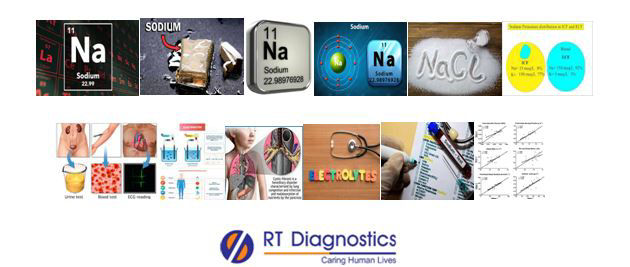Sodium Urine (Spot Urine):
Why Sodium Urine (Spot Urine) Test?
CLINICAL INFORMATION
Sodium (Na+) is an electrolyte (the substance that carries an electrical charge), found mostly in the body fluids outside the cells. The body obtains sodium through foods and fluid intake (drinks). Kidneys maintain consistent levels of sodium by regulating the quantity excreted in the urine. The excess sodium is excreted through urine, stool, sweat etc. Sodium plays a vital role in our bodies. It has a key role in the maintenance of water balance in and around the cells, normal blood pressure, proper nerve and muscle function (transmission of impulse), regulating the body’s fluid balance etc. Low levels of sodium in serum (blood levels) lead to hyponatremia. Signs and symptoms of low sodium include headache, restlessness, irritability, shortness of breath, muscle weakness, spasm, cramps, altered personality, lethargy, confusion, seizure, edema, coma, and death. Causes of low sodium include chronic and/or severe vomiting, diarrhoea (loss of electrolytes), increased ADH, Cushing’s syndrome, excessive intake of water etc. risk factors include excessive diuretics, high doses of antidepressants and/or anti-seizure medications, opioids, underactive thyroid or adrenal glands, decreased function of heart, liver, kidneys, syndrome of inappropriate anti-diuretic hormone (SIADH), anti-cancer drugs (chemotherapy), certain illnesses like pneumonia, hormonal changes, UTI, recreational ecstasy drug abuse etc. High-risk factors include age, certain medications, intensive physical exercise, kidney disease, cirrhosis, congestive heart failure, post-menopausal women are associated with a higher risk of developing hyponatremia-related brain damage etc. Untreated chronic neglected cases may lead to complications such as rapid swelling of the brain, overactive reflexes, loss of consciousness, coma, osteoporosis and death. Hypernatremia is an abnormal condition of rising serum sodium concentrations, and its pathology is due to the formation of hyperosmolar condition relative to a decrease in total body water subjected to its electrolyte content. Hypernatremia is increased levels of sodium in the body. It could result due to disorders of the adrenal glands, diabetes, excessive fluid loss through sweating, diarrhoea, diuretics, excessive intake of sodium in the diet, medications such as NSAIDs, OCPs, and laxatives etc. Blood sodium is a part of an electrolyte panel. Sodium can also be estimated in other fluids and urine (eg. spot urine) sample specimens. Sodium spot urine test is indicated in conditions such as volume depletion, pathologies associated with kidney, renal failure, oligouria, hyponatremiaetc. This test may also be useful in abnormal conditions such as consumption of excessive salt, intake of less food (fasting), less intake of water, serious illness, surgery, monitoring IV fluids (continuous drips during or after surgery) etc. Additional tests include basic metabolic panel test or comprehensive metabolic panel test, blood glucose test etc. Other tests include ECG, EEG etc.

General Instructions:
Sample Requirement: Specimen - Urine Sample (Spot Urine). Test Preparation: None.
NOTE - Sample for specimen collections may vary based on the patient’s condition/cases according to the patient’s presenting complaints/signs or symptoms:
SPECIMEN REQUIREMENT (Special or Rare Cases) - As instructed and guided by Physician / Clinician / Pathologist / as per Laboratory’s requirements, according to procedures and protocols.
This Multi-Specialty Clinical Referral Laboratory RT DIAGNOSTICS provides precise and accurate tests with an extensive range of testing services to the medical centres to help in the diagnosis and identification of pathology in the test specimens for infectious diseases and also to evaluate the function of organ systems of the patient. It prevents further complications and helps to stabilize and restore health to near normalcy at the earliest without delay.



